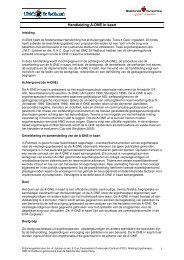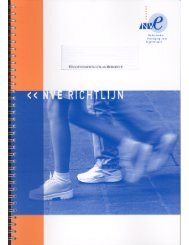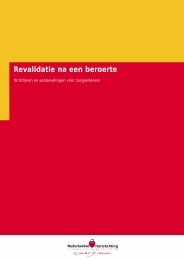Richtlijn Cognitieve Revalidatie - SEN
Richtlijn Cognitieve Revalidatie - SEN
Richtlijn Cognitieve Revalidatie - SEN
You also want an ePaper? Increase the reach of your titles
YUMPU automatically turns print PDFs into web optimized ePapers that Google loves.
46. Heutink M, Eilander HJ. Incidentie van ernstig traumatisch hersenletsel op een<br />
maand na trauma bij kinderen en jongeren in Nederland. 2006(In preparation).<br />
47. Ashwal S. Recovery of consciousness and life expectancy of children in a vegetative<br />
state. Neuropsychol Rehabil. 2005;15(3-4):190-7.<br />
48. Limburg M, Hijdra A, Cools HJM. Cerebrovasculaire aandoeningen. Houten: Bohn,<br />
Stafleu en van Loghum; 1999.<br />
49. Elovic EP, Dobrovic NM, Fellus L. Fatigue after traumatic brain injury. In: DeLuca J,<br />
editor. Fatigue as a window to the brain. Massachusetts: Instituite of Technology; 2005. p.<br />
89-105.<br />
50. Ingles JL, Eskes GA, Phillips SJ. Fatigue after stroke. Arch Phys Med Rehabil. 1999<br />
Feb;80(2):173-8.<br />
51. Staub F, Bogousslavsky J. Post-stroke depression or fatigue. Eur Neurol.<br />
2001;45(1):3-5.<br />
52. Chaudhuri A, Behan PO. Fatigue and basal ganglia. J Neurol Sci. 2000 Oct 1;179(S<br />
1-2):34-42.<br />
53. Chaudhuri A, Behan PO. Fatigue in neurological disorders. Lancet. 2004 Mar<br />
20;363(9413):978-88.<br />
54. DeLuca J. Fatigue, cognition, and mental effort. In: DeLuca J, editor. Fatigue as a<br />
window to the brain. Cambridge, Massachusetts: MIT Presse; 2005.<br />
55. Ponsford JL, Willmott C. Rehabilitation of nonspatial attention. In: Ponsford JL, editor.<br />
Cognitive and behavioral rehabilitation. New York: Guildford Press; 2004. p. 59-99.<br />
56. van Zomeren AH, Brouwer WH. Clinical Neuropsychology of Attention. New York,<br />
Oxford: University Press; 1994.<br />
57. Spikman JM, Zomeren AH, Deelman B. Deficits of attention after closed-head injury:<br />
slowness only? J Clin Exp Neuropsychol. 1996;18(5):755-67.<br />
58. Spikman JM, Kiers HA, Deelman BG, van Zomeren AH. Construct validity of concepts<br />
of attention in healthy controls and patients with CHI. Brain Cogn. 2001 Dec;47(3):446-60.<br />
59. Niemann H, Ruff RM, Baser CA. Computer-assisted attention retraining in headinjured<br />
individuals: a controlled efficacy study of an outpatient program. J Consult Clin<br />
Psychol. 1990 Dec;58(6):811-7.<br />
60. Gray IM, Robertson I, al e. Microcomputerbased attentional retraining after brain<br />
damage: a randomized group controlled trial. Neuropsychol Rehabil. 1992;2:97-115.<br />
61. Ponsford JL, Kinsella G. Evaluation of a remedial programme for attentional deficits<br />
following closed-head injury. J Clin Exp Neuropsychol. 1988 Dec;10(6):693-708.<br />
62. Strache W. Effectiveness of two modes of training to overcome deficits of<br />
concentration. Int J Rehabil Res. 1987;10(4 Suppl 5):141-5.<br />
63. Novack TA, Caldwell SG, Duke LW, Berquist T. Focused versus unstructured<br />
intervention for attentional deficits after traumatic brain injury. J Head Trauma Rehabil.<br />
1996;11(3):52-60.<br />
64. Sohlberg MM, Mateer CA. Effectiveness of an attention-training program. J Clin Exp<br />
Neuropsychol. 1987 Apr;9(2):117-30.<br />
65. Sohlberg MM, McLaughlin KA, Pavese A, Heidrich A, Posner MI. Evaluation of<br />
attention process training and brain injury education in persons with acquired brain injury. J<br />
Clin Exp Neuropsychol. 2000 Oct;22(5):656-76.<br />
66. Sturm W, Wilmes K. Efficacy of a reaction training on various attentional and<br />
cognitive functions in stroke patients. Neuropsychol Rehabil. 1991;1:259-80.<br />
67. Ponsford JL, Olver JH, Curran C. A profile of outcome: Two years after traumatic<br />
brain injury. Brain Inj. 1995;9:1-10.<br />
68. Ponsford JL. Cognitive and behavioural rehabilitation: from neurobiology to clinical<br />
practice. New York: Guilford Press; 2004.<br />
69. Fasotti L, Kovacks F, Eling PA, Brouwer WH. Time pressure Management as a<br />
compensatory strategy training after closed head injury. Neuropsychol Rehabil. 2000;10:47-<br />
65.<br />
41





